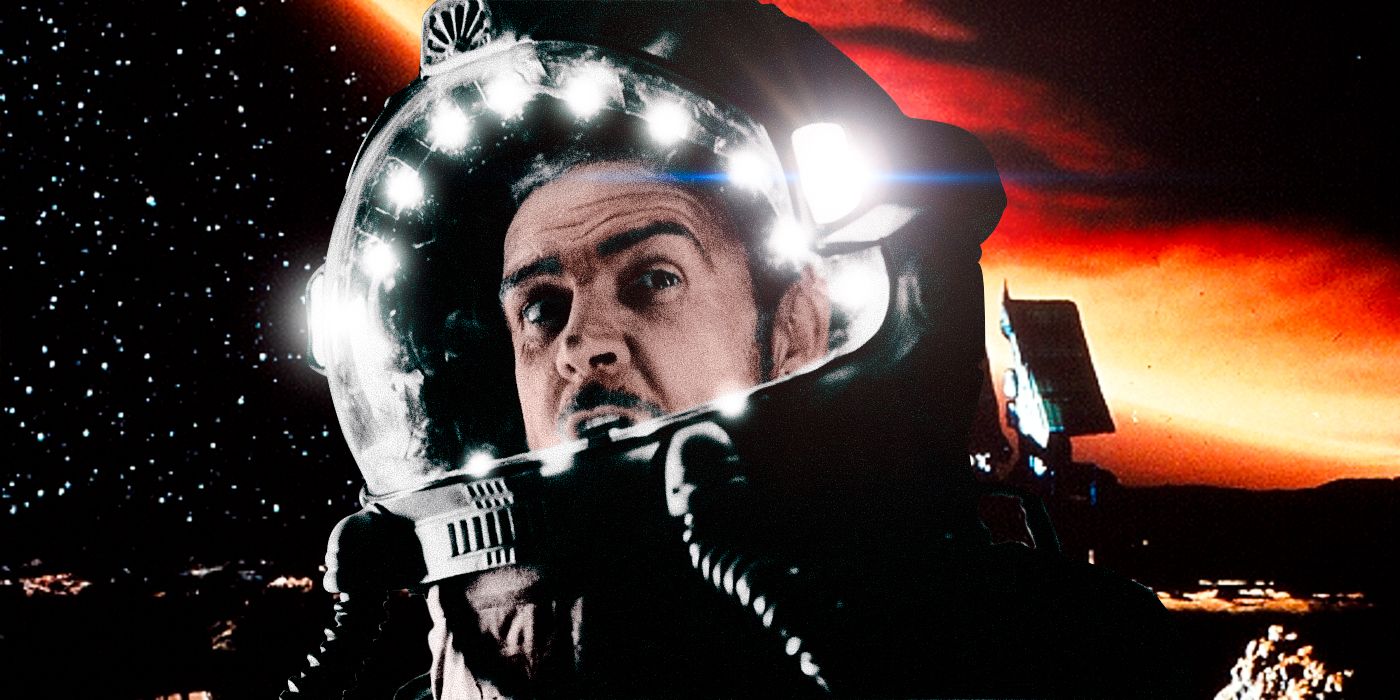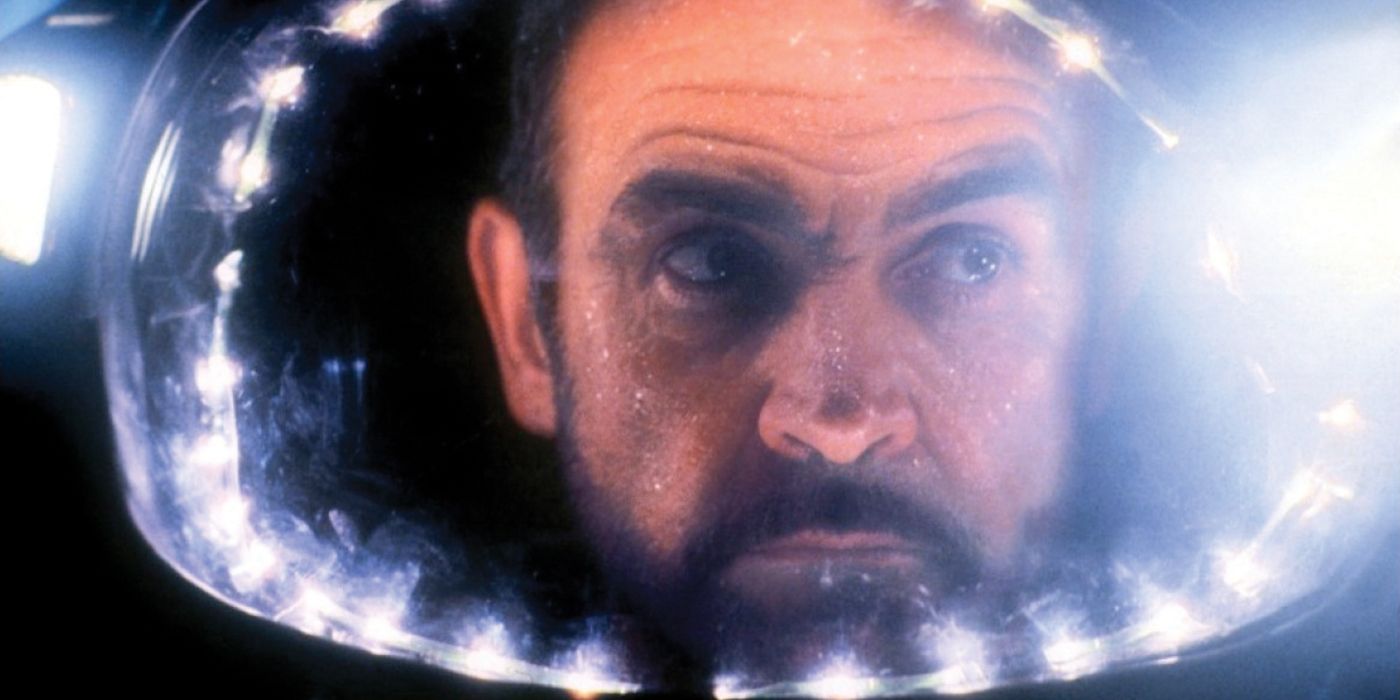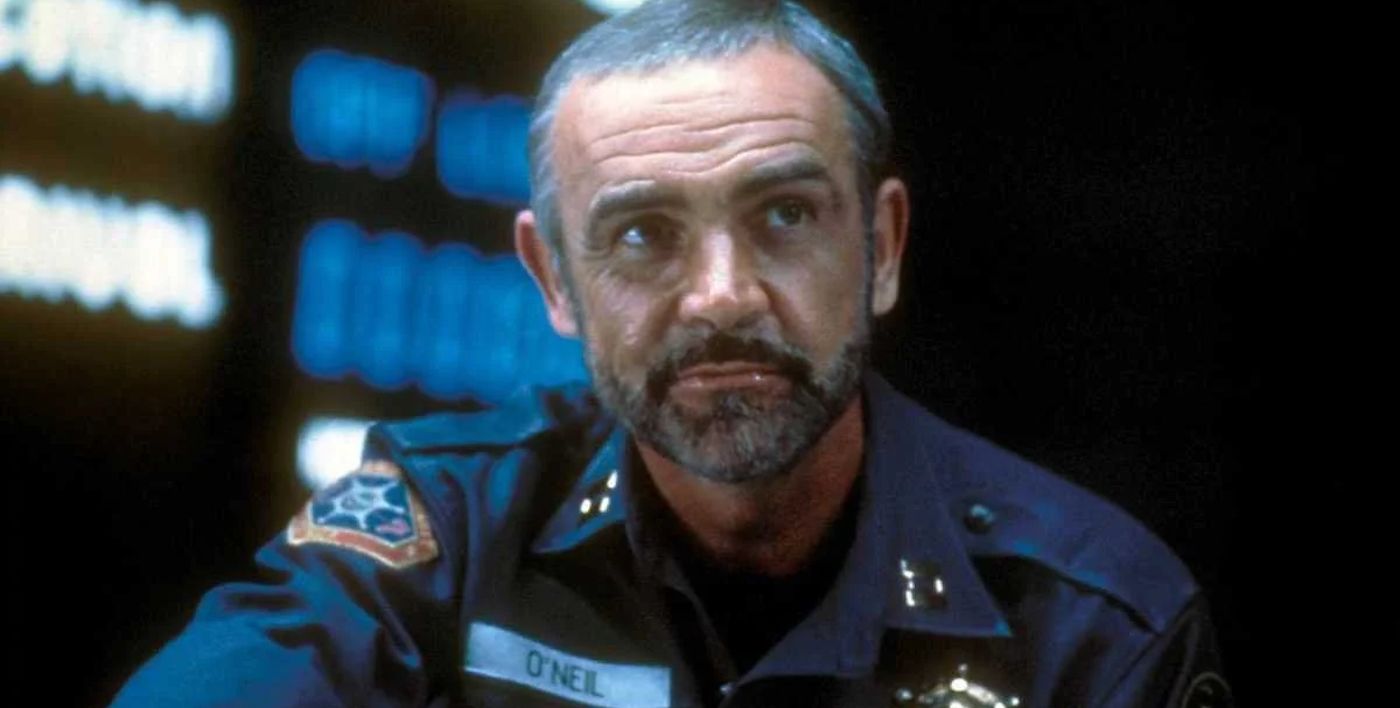Outland, the sci-fi thriller from writer/director Peter Hyams, stars Sean Connery as Will O’Niel, a disgraced lawman investigating a series of mysterious deaths at a mining colony on Io, one of Jupiter’s moons. The film, which celebrates its 40th anniversary this month, was part of a string of grimy R-rated science fiction movies trying to capitalize on the unexpected success of Ridley Scott’s Alien (in fact, several people involved in the production of Alien also worked on Outland). Like the majority of those films, Outland was a commercial disappointment that has spent the last several decades in relative obscurity, while Connery and Hyams went on to further cement their respective legacies as Hollywood legends — Connery with a string of classic performances including his Academy Award-winning role in The Untouchables, and Hyams with the 1994 Jean Claude Van Damme action thriller Timecop.
But Outland is a movie that deserves to be talked about, and not merely as a trivia question about the time James Bond did a space movie with the Timecop guy. You see, Outland is technically a remake of the 1952 classic Western High Noon, starring Gary Cooper as a good-hearted local sheriff named Will Kane who is forced to face a gang of outlaws on his own after the rest of the town refuses to help. But Outland does more than just update the setting in a cynical attempt to capitalize on the sudden popularity of space movies in the early 1980s. It breaks High Noon down to its essential thematic elements and recontextualizes those elements for a modern audience, allowing the original film’s meditations on virtue and duty to resonate as powerfully as they did back in the 1950s while also providing a bodacious kaleidoscope of shotgun fights in outer space and PIXAR favorite John Ratzenberger's head exploding from rapid decompression.
'Outland' Isn't a Staightforward Remake of 'High Noon'
First of all, Outland isn’t a straightforward remake. It would perhaps be more accurate to say that it was “inspired by” High Noon, because while the basic story is the same (an ill-equipped lawman must face down a gang of criminals on his own), the plots of the two films are extremely different. High Noon is a straightforward western that begins with Will Kane hearing about the impending arrival of Frank Miller’s murderous gang almost immediately. The majority of the film is a ticking clock, as Will desperately tries to find anyone in town to posse up with him before the train carrying Miller and his gang reaches the station.
In Outland, the ticking clock element of High Noon is moved entirely to the third act. The first two-thirds of the film are closer to a mystery thriller, following Will O’Niel as he investigates the mining facility’s recent rash of bizarre accidents. Whereas Will Kane knowns exactly who is coming for him and why, and devotes most of his time to trying to convince a town full of ungrateful people to finally help him in his time of need, Will O’Niel spends the first two-thirds of Outland uncovering a vast conspiracy involving mining productivity, a futuristic amphetamine that causes psychotic episodes, and vengeful space gangsters. Just altering these elements already puts Outland a cut above other remakes, as it prefers to echo High Noon rather than be beholden to it. (And honestly, if you’re going to do a remake, why bother settling for a slightly different version of the original?)
But Outland’s primary strength as a remake, and ultimately as a standalone film, is that it takes the thematic conflict of High Noon and updates it for contemporary audiences in a way that is still relevant four decades later. Will Kane’s struggle in High Noon was about the question of duty over self – Will has to decide whether to confront a gang of outlaws coming to town to kill him, putting his life on the line to defend a bunch of people who wouldn’t spit on him if his head were on fire, or to hop on a train with his wife and leave town before the gang arrives. It’s a well-made drama that subverts the accepted definition of “morality” in the 1950s by having all of the able-bodied churchgoing townsfolk refuse to help Will. His only aid comes from “undesirables” like the town drunk and the Mexican hotel owner, Helen Ramirez (Katy Jurado).
On top of being literally the only person of color in the film, Helen also carries the unfair reputation of being the town floozy, simply because she’s an unmarried woman who has had relationships with a few local men (including Will). Helen guilts Will’s churchgoing, pacifist wife into leaving the train station and coming back into town to help him fight off the gunmen. After Will successfully kills all four of them, the townsfolk gather round to congratulate him, but he throws his badge down into the dirt in disgust. He didn’t risk his life to protect the town because he liked its people; he did it because he was duty-bound to stand up to the outlaws, and because it was the right thing to do. It seems like an unsatisfying and thankless sacrifice, but Will couldn’t have lived with himself otherwise. He knew it was the right decision, and that’s ultimately what mattered. High Noon is an exploration of the concepts of bravery and cowardice, and of being true to your own understanding of virtue rather than the definition others try to force on you.
'Outland' Updates Will's Struggle For a Modern Audience
Meanwhile, Outland retains Will’s same basic internal struggle but updates it for modern audiences, removing High Noon’s dependence on puritanical definitions of morality by casting everyone as an “undesirable.” In Outland, Will is the marshal in charge of security at a franchised mining facility on Jupiter’s moon Io. Because of the extreme conditions and the mining company’s predilection for bending labor laws, everyone working at the facility is some kind of outsider, a collection of burnouts and reprobates digging up titanium at the edge of the galaxy. The workers mostly have criminal records, as do the majority of the administrative staff, including Will’s prickly confidant Dr. Lazarus (Frances Sternhagen), who ironically quips that she’s one shuttle ride ahead of a malpractice suit. It’s implied that Will himself has a blighted record; we learn that he’s spent the past several years moving from one dead-end outer space deployment to another, dragging his long-suffering wife Carol (Kika Markham) and his hilariously wooden son Paulie (Nicholas Barnes) across the galaxy on a never-ending tour of depressing space stations. Paulie has never even been to Earth, so whatever Will did to make him unemployable as a peace officer back home must have been more serious than ignoring a few parking tickets.
After a handful of workers die in a series of suspicious accidents and one full-blown psychotic meltdown, Will starts digging into the background of the station’s general manager Sheppard (Peter Boyle), and discovers that Sheppard is the middleman in a lucrative conspiracy to sell performance-enhancing drugs to the miners that increases their productivity while earning a pretty penny for the shadowy organization providing the narcotics. However, Will also learns that the conspiracy is essentially an open secret at the facility; his fellow marshals are all aware of it and collect handsome bribes to keep their heads turned the other way, and everyone expects him to do the same. After all, both the workers and the mining company are happy, and the only people dying are a few “undesirables” that nobody will miss anyway.
What Is the Main Difference Between 'High Noon' and 'Outland'?
Therein lies the major difference between High Noon and Outland, and what makes Outland so successful as a remake. High Noon’s Will Kane is a morally upright man learning that doing the right thing is frequently unpopular and dangerous, and that any measure of character goes right out the window if you refuse to stand up for your own principles. In contrast, Outland’s Will O’Niel is a blacklisted rent-a-cop hired to babysit a bunch of disreputable miners without making any waves. Both men are faced with the same questions about the nature of right and wrong and duty versus selfishness, but while Will Kane is an archetypal hero discovering the world isn’t as black and white as he was led to believe, Will O’Niel already exists firmly in the gray when we meet him. Will Kane’s objection occurs when he realizes that a lifetime of duty and service has only earned him the begrudging respect of a town that refuses to risk anything in return for his sake; Will O’Niel lives in the shit because he thinks that’s all he deserves, but finally objects after learning that his coworkers and employers think so little of him that they expect him to accept his bribe and fall in line while people continue to die. It’s still a question of integrity, but presented in two very different lights.
By updating not only the setting of High Noon but also the moral conflict at its center, Outland successfully reinterprets the story for a new generation of moviegoers. Rather than simply redoing the movie with a new cast and modern dialogue and setpieces, Outland took the bones of its predecessor and created a more relatable exploration of the same themes, resulting in a movie that is both a perfect companion piece to High Noon as well as a captivating story that stands on its own. In my opinion, that’s the best possible achievement a remake can accomplish. Also, who doesn’t want to watch Sean Connery get into an astronaut fistfight with Clarke Peters while scaling the exterior of a moon base?



